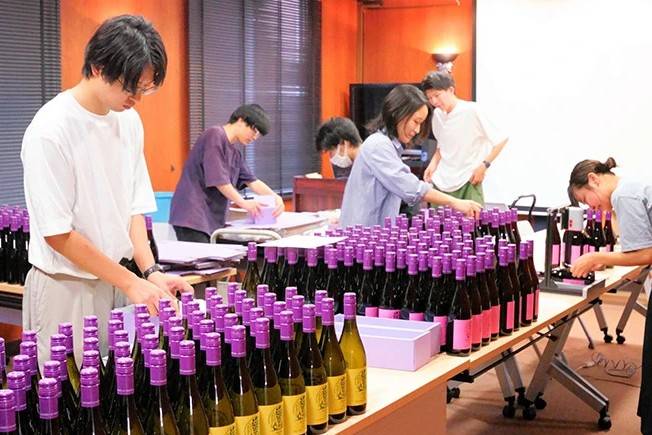University of Yamanashi Pioneers Independent Winemaking and Sales in Japan
Students oversee every stage from grape cultivation to retail, marking a new era for academic enology and hands-on education.
2025-10-07

The University of Yamanashi has become the first academic institution in Japan to complete the entire winemaking process independently, from grape cultivation to retail sales. The Institute of Enology and Viticulture (IEV) at the university, located in Kofu, announced that it has produced and sold wine without any involvement from private sector wineries. This marks a significant shift from previous practices, where products developed by universities were commercialized through partnerships with established wine companies.
The project, known as the “Yamanashi University Shin Wine Project,” is managed entirely by the IEV. The word “Shin” in Japanese can mean “new” or “genuine,” reflecting the institute’s aim to create an authentic and innovative approach to winemaking within an educational setting. In early September, student volunteers harvested Muscat Bailey A grapes—a red wine variety native to Japan—on a farm owned by a university employee. After picking, students removed stems and unripe fruit at the IEV offices before pressing the grapes and preparing them for fermentation in tanks. Later in September, Koshu grapes, which are used for white wine and are indigenous to Yamanashi Prefecture, were also scheduled for harvest and fermentation.
While several Japanese universities have lent their names to wine products in the past, those efforts always involved collaboration with private companies. In contrast, the University of Yamanashi’s new project is fully self-contained. Professor Shunji Suzuki, who leads the IEV, said that these wines represent both the technology and passion cultivated at the university.
The IEV has a long history dating back to 1947, when it was established under Yamanashi’s School of Engineering. It has since focused on improving local wine quality and training future experts through research on grape genomics and winemaking technology. Until now, however, wines produced as part of student coursework were discarded rather than sold.
Professor Suzuki launched the “Shin” project to give students hands-on experience with every stage of winemaking—including marketing and sales. He began selecting vineyard sites and producing test batches in 2023. After securing necessary licenses from public health authorities and tax offices, he obtained permission to produce wine on campus for commercial sale. In 2024, Suzuki turned to crowdfunding to finance new equipment and facilities, raising nearly twice his initial goal.
This spring, project members planted grapes and later harvested about 600 kilograms each of Muscat Bailey A and Koshu varieties in autumn. The grapes were matured at low temperatures for six months before bottling. Due to their small production scale compared to commercial wineries, students used smaller stainless steel tanks that require careful temperature control and strict adherence to basic winemaking principles.
According to Suzuki, students have succeeded in producing a “clean” wine that avoids off-flavors and reflects the character of each year’s harvest. In spring 2024, about 1,000 bottles were sealed with labels designed by students following a campus-wide competition. The 750-milliliter bottles went on sale in July at three locations in Kofu: a campus convenience store, a liquor shop, and another retail outlet. Each bottle was priced at 2,500 yen (about $17), including tax.
Feedback from consumers has been positive so far, with comments received through social media channels such as X (formerly Twitter) and other platforms.
Looking ahead, the IEV is expanding its research efforts. To address climate change challenges, staff planted environmentally friendly grape varieties developed in Yamanashi this April. They are also experimenting with a new grape type that takes five years to mature but is more resistant to heat-related deterioration.
As a second phase of the project, IEV officials plan to distill some of their wine into brandy—a process not undertaken at the university for about two decades due to its complexity. They intend to use traditional distillation methods that require aging for up to 30 years. Crowdfunding efforts for this initiative have again exceeded expectations.
Professor Suzuki emphasized that while wine studies may not attract widespread attention, they help build strong support for the university’s research mission. The IEV is currently showcasing its work outside Kofu Station’s north exit until January. The display features information panels about the wine project, actual barrels and bottles of wine, and interactive sections where visitors can guess different aromas.
Through these efforts, the University of Yamanashi aims to remain at the forefront of enological research while providing practical training opportunities for its students.
Founded in 2007, Vinetur® is a registered trademark of VGSC S.L. with a long history in the wine industry.
VGSC, S.L. with VAT number B70255591 is a spanish company legally registered in the Commercial Register of the city of Santiago de Compostela, with registration number: Bulletin 181, Reference 356049 in Volume 13, Page 107, Section 6, Sheet 45028, Entry 2.
Email: [email protected]
Headquarters and offices located in Vilagarcia de Arousa, Spain.